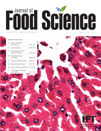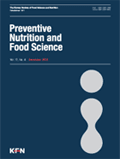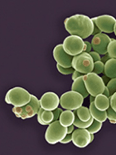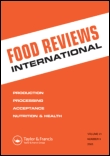
eFood
Scope & Guideline
Transforming food systems with open-access knowledge.
Introduction
Aims and Scopes
- Nutritional Science and Health Benefits:
Investigates the nutritional components of various foods and their health implications, including studies on phytochemicals, functional foods, and dietary supplements. - Food Technology and Innovation:
Covers advancements in food processing, preservation, and formulation, with a focus on novel techniques such as nanotechnology and bioengineering. - Food Safety and Quality Control:
Examines methods and technologies aimed at ensuring food safety, including detection of contaminants and evaluation of food quality. - Functional Foods and Nutraceuticals:
Explores the development and characterization of functional foods that provide health benefits beyond basic nutrition, including studies on probiotics, prebiotics, and bioactive compounds. - Sustainable Food Practices:
Addresses sustainability in food production and consumption, focusing on the valorization of food waste and the use of eco-friendly practices in food processing.
Trending and Emerging
- Functional Foods and Gut Health:
There is a notable increase in research addressing the role of functional foods and gut microbiota in health outcomes, including studies on postbiotics and probiotics. - Phytochemicals and Natural Bioactive Compounds:
Research focused on the extraction, characterization, and health benefits of phytochemicals is on the rise, indicating a growing interest in natural products as functional ingredients. - Food-Nutrition-Disease Interrelationship:
Studies exploring the connections between diet, nutrition, and various diseases, including metabolic disorders and neurodegenerative diseases, are increasingly prevalent. - Innovative Food Processing Techniques:
Emerging technologies such as nanotechnology and novel extraction methods are gaining attention for their potential to enhance food quality and safety. - Sustainable and Eco-Friendly Food Practices:
Research on sustainable food practices, including the valorization of food waste and the development of environmentally friendly food technologies, is becoming a significant focus.
Declining or Waning
- Traditional Food Preservation Techniques:
Research on traditional methods of food preservation appears to be decreasing, as modern technologies and innovations gain more attention in the field. - Basic Agricultural Practices:
Studies centered on conventional agricultural practices are becoming less prominent, possibly overshadowed by research focusing on innovative and sustainable agricultural methods. - Generic Food Composition Studies:
There seems to be a decline in publications that merely catalog food compositions without exploring their health benefits or technological applications, reflecting a shift toward more applied research.
Similar Journals

Ukrainian Food Journal
Fostering collaboration in food science and biochemistry.Ukrainian Food Journal is an esteemed open-access journal dedicated to advancing the field of food science and biochemistry. Established in 2012 and published by the National University of Food Technologies in Ukraine, the journal serves as a vital platform for researchers and professionals to disseminate their findings on food technology, safety, and nutritional biochemistry. With an ISSN of 2304-974X and E-ISSN 2313-5891, it offers a wealth of knowledge to its readers, promoting innovation and collaboration within the industry. While currently categorized within the Q4 quartile of biochemistry and the Q3 quartile of food science, the journal is progressively gaining recognition, reflecting a commitment to quality research in a competitive field. The journal is indexed in Scopus, ranking #271 in Food Science and #376 in Biochemistry, underscoring its relevance and contribution to agricultural and biological sciences. The Ukrainian Food Journal not only enriches the academic community with its open-access model but also aims to foster dialogue among researchers, professionals, and students dedicated to improving food systems and nutrition. It operates from its headquarters in Kyiv, offering a hub for creativity and advancement in food-related research.

JOURNAL OF FOOD SCIENCE
Championing the Quest for Food Integrity and SafetyJOURNAL OF FOOD SCIENCE, published by Wiley, is a premier journal dedicated to advancing the field of food science, bridging the gap between fundamental research and practical application. With an impressive impact factor reflecting its authoritative status, the journal is ranked in the Q1 quartile for Food Science in 2023 and boasts a Scopus ranking of #71 out of 389, placing it in the 81st percentile within Agricultural and Biological Sciences. First launched in 1936, the journal continues to serve as an essential platform for researchers, professionals, and students to disseminate innovative studies and reviews that address critical issues in food quality, safety, and technology. While not currently offering open access, its rigorous peer-review process ensures the dissemination of high-quality and impactful research. Researchers engaged in the vital disciplines of food science will find this journal indispensable for keeping abreast of cutting-edge developments in the field.

npj Science of Food
Transforming Food Science with Open Access Insightsnpj Science of Food is a premier journal published by NATURE PORTFOLIO, focusing on groundbreaking research in the fields of Food Science and Public Health. Since its inception in 2017, this Open Access journal has rapidly established itself as a vital resource for researchers and professionals alike, contributing significantly to advancements in scientific knowledge related to food safety, sustainability, and nutritional health. With an impressive Q1 ranking in both Food Science and Public Health for 2023, and a Scopus ranking placing it in the top 12% of related fields, the journal serves as a critical platform for disseminating high-quality research. Situated in the United Kingdom and operating with a global perspective, npj Science of Food encourages the publication of innovative and interdisciplinary studies aimed at addressing real-world challenges in food systems and human well-being. Researchers, professionals, and students looking to stay at the forefront of food science can access a wealth of knowledge and insights through this impactful journal.

Preventive Nutrition and Food Science
Illuminating Research at the Forefront of Food Science and NutritionPreventive Nutrition and Food Science, an esteemed journal published by the Korean Society of Food Science and Nutrition, serves as a pivotal platform for the dissemination of innovative research and insights in the fields of food science, nutrition, and dietetics. With an ISSN of 2287-1098 and an E-ISSN of 2287-8602, this journal is dedicated to advancing knowledge from 2012 through 2024, showcasing contributions that reflect the interplay between nutrition, health, and preventive strategies. Indexed in Scopus, it proudly holds a Q2 ranking in Food Science and a Q3 ranking in Nutrition and Dietetics as of 2023, positioning it among influential publications within these disciplines. Researchers, professionals, and students can explore cutting-edge studies that contribute significantly to evidence-based practices, enhancing public health and nutritional care. Although it operates under a subscription model, the journal plays a crucial role in fostering a deeper understanding of preventive nutrition, advocating for advancements that address contemporary dietary challenges.

Foods
Uniting Disciplines for Comprehensive Food Insights.Foods is a premier open access journal published by MDPI, based in Switzerland, that has been at the forefront of disseminating high-quality research in the fields of food science, health professions, and plant science since its establishment in 2012. With an impressive convergence of interdisciplinary studies spanning various aspects of food, nutrition, and microbiology, the journal aims to provide a comprehensive platform for researchers and professionals to share innovative ideas and findings. Maintained as a Q1 journal in multiple categories for 2023, including Food Science and Health Professions, Foods has garnered significant recognition within the academic community, reflected in its strong Scopus rankings and percentiles across various disciplines. The journal not only promotes open access to enhance the visibility and accessibility of research but also encourages the exploration of sustainable food systems and health-related issues, thus contributing to essential discussions in today's society. For those looking to advance their understanding and expertise in food-related sciences, Foods serves as an enduring resource for groundbreaking studies and critical insights.

FOOD SCIENCE AND BIOTECHNOLOGY
Exploring the Intersection of Science and Culinary ArtsFOOD SCIENCE AND BIOTECHNOLOGY, published by the Korean Society of Food Science & Technology (KOSFOST), stands as a prominent peer-reviewed journal dedicated to advancing knowledge in the fields of food science, biotechnology, and applied microbiology. With ISSN 1226-7708 and E-ISSN 2092-6456, this journal serves as a pivotal platform for disseminating high-impact research from South Korea and beyond, reflecting a robust Q2 ranking in multiple categories including Applied Microbiology and Biotechnology, Biotechnology, and Food Science as of 2023. The journal's influence is further emphasized by its positions in various Scopus ranks, where it showcases a commendable percentile ranking in Agricultural and Biological Sciences and Biochemistry. Although access options remain limited, the journal’s objectives revolve around the publication of innovative research, fostering interdisciplinary collaboration, and facilitating the exchange of ideas among a diverse community of researchers, professionals, and students. Whether you are involved in food technology, microbial biotechnology, or nutritional sciences, FOOD SCIENCE AND BIOTECHNOLOGY are instrumental in shaping the future of these critical fields, propelling advancements that enrich our understanding of food systems and health.

International Food Research Journal
Nurturing Interdisciplinary Dialogue in Food StudiesThe International Food Research Journal, published by UNIV PUTRA MALAYSIA PRESS, serves as a pivotal platform for disseminating innovative research within the field of food science. With an ISSN of 1985-4668 and an E-ISSN of 2231-7546, the journal has successfully established its presence since its inception in 2007, converging its findings through 2024. This esteemed journal holds a Q3 ranking in Food Science, illustrating its valuable contributions to the field as demonstrated by its Scopus rank of 276 out of 389, placing it in the 29th percentile among its peers in Agricultural and Biological Sciences. Although it operates under a traditional publishing model, its academic integrity and focus on high-quality research ensure that it remains a vital resource for researchers, professionals, and students eager to explore advances in food technology, nutrition, and safety. By encouraging interdisciplinary collaboration and critical dialogue, the International Food Research Journal plays an essential role in shaping the future of food science research.

Annual Review of Food Science and Technology
Advancing the Frontiers of Food ScienceThe Annual Review of Food Science and Technology, published by ANNUAL REVIEWS, is an esteemed journal dedicated to advancing the knowledge within the field of food science. With an impressive Q1 ranking in the Food Science category, and ranking as #6 out of 389 in the Scopus Agricultural and Biological Sciences category, the journal serves as a vital resource for researchers, professionals, and students. This publication encapsulates comprehensive reviews and cutting-edge research, helping to bridge the gap between research and practical application. Though it does not offer Open Access, it provides valuable insights into various aspects of food science from 2010 to 2024, ensuring that its readership stays at the forefront of emerging trends and innovations. The journal's focus on high-quality, peer-reviewed articles makes it a critical platform for scholars looking to deepen their understanding and contribute to this rapidly evolving field.

CZECH JOURNAL OF FOOD SCIENCES
Transforming Food Systems Through Rigorous ResearchCzech Journal of Food Sciences is a premier publication in the field of food science, disseminating vital research since its inception in 1999 and transitioning to Open Access in 2007. Published by the Czech Academy Agricultural Sciences, this journal facilitates the exchange of knowledge among researchers, professionals, and students dedicated to advancing the understanding of food systems, safety, and technology. With an ISSN of 1212-1800 and an E-ISSN of 1805-9317, it holds a respectable position with a Q3 ranking in the Food Science category for 2023, illustrating its commitment to high-quality research despite its Scopus rank of 209 out of 389, situated in the 46th percentile. Located in the heart of the Czech Republic, at TESNOV 17, PRAGUE 117 05, this journal serves as an essential resource for those involved in agricultural and biological sciences, paving the way for innovative discoveries and applications in food science.

FOOD REVIEWS INTERNATIONAL
Exploring Innovations for a Sustainable Food FutureFOOD REVIEWS INTERNATIONAL, published by Taylor & Francis Inc, serves as a pivotal resource within the fields of Food Science and Chemical Engineering. Established in 1985, this esteemed journal offers a comprehensive platform for the dissemination of critical reviews that enhance understanding and innovation in the food industry. With an impressive impact factor reflecting its Q1 quartiles in both Food Science and Chemical Engineering categories, it ranks among the top journals in Scopus, securing the 24th spot in Agricultural and Biological Sciences. Scholars, researchers, and professionals are encouraged to explore its rich content, which spans meticulously reviewed articles that bridge academic research and practical applications, while contributing to advancements in food safety, processing, and sustainability. Although not an Open Access journal, access to its extensive repository is vital for anyone aiming to stay at the forefront of food science advancements.